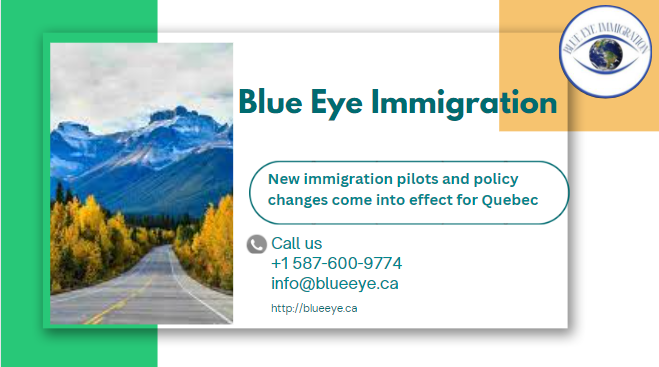Today is the first day that the new bylaw that modifies Quebec’s immigration laws goes into force. The changes consist of several new policies and initiatives that affect various immigration streams from Quebec. Continue reading to find out more about these changes and how you could be affected.
Now open are new economic pilot streams
In an effort to help with the province’s severe labor shortages, Quebec has just announced the reopening of three long-term economic immigration pilot projects.
Beginning on November 23, 2023, and ending on December 31, 2024, applications will be accepted for the following immigration streams:
- a trial program for permanent immigration for food processing workers with a ceiling of 600 applications;
- Pilot scheme for permanent immigration for orderlies (600 applications maximum); and
- Pilot program for permanent immigration for workers in the information technology, visual effects, and artificial intelligence fields (limited to 700 applications).
Although applications for these programs are regularly opened and closed, all three are anticipated to end indefinitely on January 1st, 2026.
Financial initiatives
The economic immigration schemes in Quebec will undergo modifications. It is now mandatory for candidates to be proficient in French in order to be considered for any of Quebec’s economic immigration programs.
More precisely, in accordance with the Quebec scale of French proficiency levels, applicants to the Quebec Regular Skilled Worker Program (QSWP) and the Quebec Experience Program (PEQ) must now demonstrate a minimum level of spoken French fluency of 7. The level 7 competence criterion will be a general requirement for skilled individuals to immigrate to Quebec, and it will also apply to other economic and experimental projects.
The same requirements also state that a written French proficiency level of 5 or above will be required for the PEQ. Furthermore, starting of November 23rd, candidates for the PEQ’s graduate component will need to have finished a French program or have studied the language for at least three years in secondary or post-secondary education.
Spouses who are sponsored under these financial programs are required to possess oral French competence (level 4), which includes both speaking and listening.
Finally, the Qualified Skilled Worker Selection Program (QWSP) will take the place of the Quebec Regular Skilled Worker Program (QSWP) as of November 29.
family-based funding
Starting on November 23, if the individual being sponsored for immigration to Quebec (through a family sponsorship program) is between the ages of 18 and 55, you, as the sponsor, are required to fill out and sign a welcome and integration plan. This plan will make sure that the sponsored person is supported in learning French, getting ready for their arrival in Quebec, and utilizing public services and resources to help with their integration.
Additional modifications
Apart from the aforementioned alterations, Quebec has implemented adjustments to the business streams of immigration, which will take effect on January 1st, 2024.
Specifically, these modifications require knowledge of French for all business streams (which include the Entrepreneur, Self-Employed, and Investor programs). More residency restrictions, the need for a work permit, and other modifications are included.
Arrivals in Quebec
Quebec has the most control over the immigrants and skilled workers it accepts each year out of all the provinces in Canada. This is because of the Quebec-Canada Accord, which gives the province far less federal control over programs, policies, and immigration acceptance.
The province has disclosed its immigration targets, which correspond with the national immigration targets set by Canada. A minimum of 49,500 immigrants are expected to arrive in Quebec this year, and an additional 50,000 are scheduled to arrive in 2024 and 2025 (per year). Similar to the federal plan, Quebec’s immigration strategy devotes the majority of its additional immigrant quotas to economic immigration initiatives. From 2023 to 2025, the province anticipates the arrival of about 32,000 foreign skilled workers on an annual basis.
Beyond its own immigration, Quebec has a significant impact on immigration in general. The province emphasizes the value of Francophone immigration across Canada, which is an increasingly popular immigration category.
